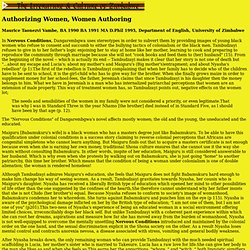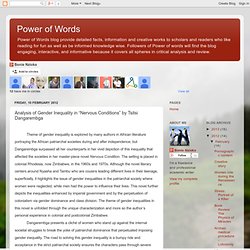

Language_and_Power[1].pdf. Tsitsi Dangarembga: An Overview. Thomas.pdf. Nervous Conditions Title Analysis by Emelia Perkins on Prezi. 8539 25814 1 PB. Disembodying The Corpus: Postcolonial Pathology in Tsitsi Dangarembga's 'Nervous Conditions' Juz021001003.pdf. Inside-english - Nervous Conditions - a matter of Identity. Disembodying The Corpus: Postcolonial Pathology in Tsitsi Dangarembga's 'Nervous Conditions' Nervous Conditions: the characters. Nervous Conditions Study Guide. Nervous Conditions. MbathaP 2009. Authorizing Women, Women Authoring. Maurice Taonezvi Vambe, BA 1990 BA 1991 MA D.Phil 1995, Department of English, University of Zimbabwe In Nervous Conditions, Dangarembgwa uses stereotypes in order to subvert them by providing images of young black women who refuse to consent and succumb to either the bullying tactics of colonialism or the black men.

Tambudzayi refuses to give in to her father's logic enjoining her to stay at home like her mother, learning to cook and preparing to reproduce the community through marriage because she will not "cook books and feed them to (her) husband" (15). Nervous Conditions: Character Analysis. Power of Words: Analysis of Gender Inequality in “Nervous Conditions” by Tsitsi Dangarembga. Theme of gender inequality is explored by many authors in African literature portraying the African patriarchal societies during and after independence; but Dangarembga surpassed all her counterparts in her vivid depiction of this inequality that affected the societies in her master-piece novel Nervous Condition.

The setting is placed in colonial Rhodesia, now Zimbabwe, in the 1960s and 1970s. Although the novel literary centers around Nyasha and Tambu who are cousins leading different lives in their teenage, superficially, it highlights the issue of gender inequalities in the patriarchal society where women were neglected, while men had the power to influence their lives.